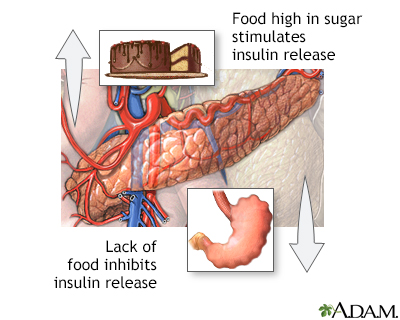Diabetic hyperglycemic hyperosmolar syndrome
Diabetic hyperglycemic hyperosmolar syndrome (HHS) is a complication of type 2 diabetes. It involves an extremely high blood sugar (glucose) level without the presence of ketones.
Type 2 diabetes
Type 2 diabetes is a lifelong (chronic) disease in which there is a high level of sugar (glucose) in the blood. Type 2 diabetes is the most common f...

Causes
HHS is a condition of:
- Extremely high blood sugar level
-
Extreme lack of water (dehydration)
Dehydration
Dehydration occurs when your body does not have as much water and fluids as it needs. Dehydration can be mild, moderate, or severe, based on how much...
 ImageRead Article Now Book Mark Article
ImageRead Article Now Book Mark Article - Decreased alertness or consciousness (in many cases)
A buildup of ketones in the body (ketoacidosis) may also occur, but it is unusual and is often mild compared with diabetic ketoacidosis.
Diabetic ketoacidosis
Diabetic ketoacidosis (DKA) is a life-threatening problem that affects people with diabetes. It occurs when the body starts breaking down fat at a r...

HHS is more often seen in people with type 2 diabetes who don't have their diabetes under control. It may also occur in those who have not been diagnosed with diabetes. The condition may be brought on by:
- Infection
- Other illness, such as heart attack or stroke
- Medicines that decrease the effect of insulin in the body
- Medicines or conditions that increase fluid loss
- Running out of, or not taking prescribed diabetes medicines
Normally, the kidneys try to make up for a high glucose level in the blood by allowing the extra glucose to leave the body in the urine. But this also causes the body to lose water. If you do not drink enough water, or you drink fluids that contain sugar and keep eating foods with carbohydrates, you become very dehydrated. When this occurs, the kidneys are no longer able to get rid of the extra glucose. As a result, the glucose level in your blood can become very high, sometimes more than 10 times the normal amount.
The loss of water also makes the blood more concentrated than normal. This is called hyperosmolarity. It is a condition in which the blood has a high concentration of salt (sodium), glucose, and other substances. This draws the water out of the body's other organs, including the brain.
Risk factors include:
-
A stressful event such as infection, heart attack, stroke, or recent surgery
Heart attack
Most heart attacks are caused by a blood clot that blocks one of the coronary arteries. The coronary arteries bring blood and oxygen to the heart. ...
 ImageRead Article Now Book Mark Article
ImageRead Article Now Book Mark ArticleStroke
A stroke occurs when blood flow to a part of the brain stops. A stroke is sometimes called a "brain attack. " If blood flow is cut off for longer th...
 ImageRead Article Now Book Mark Article
ImageRead Article Now Book Mark Article - Heart failure
Heart failure
Heart failure is a condition in which the heart is no longer able to pump oxygen-rich blood to the rest of the body efficiently. This causes symptom...
 ImageRead Article Now Book Mark Article
ImageRead Article Now Book Mark Article - Impaired thirst
- Limited access to water (especially in people with dementia or who are bedbound)
Dementia
Dementia is a loss of brain function that occurs with certain diseases. It affects one or more brain functions such as memory, thinking, language, j...
 ImageRead Article Now Book Mark Article
ImageRead Article Now Book Mark Article - Older age
- Poor kidney function
- Poor management of diabetes, not following the treatment plan as directed
- Stopping or running out of insulin or other medicines that lower glucose level
Symptoms
Symptoms may include any of the following:
- Increased thirst and urination (at the beginning of the syndrome)
Increased thirst
Excessive thirst is an abnormal feeling of always needing to drink fluids.
 ImageRead Article Now Book Mark Article
ImageRead Article Now Book Mark ArticleUrination
Excessive amount of urination means that your body makes larger than normal amounts of urine each day.
 ImageRead Article Now Book Mark Article
ImageRead Article Now Book Mark Article - Feeling weak
- Nausea
- Weight loss
- Dry mouth, dry tongue
- Fever
- Seizures
Seizures
A seizure is the physical changes in behavior that occurs during an episode of specific types of abnormal electrical activity in the brain. The term ...
 ImageRead Article Now Book Mark Article
ImageRead Article Now Book Mark Article - Confusion
Confusion
Confusion is the inability to think as clearly or quickly as you normally do. You may feel disoriented and have difficulty paying attention, remembe...
 ImageRead Article Now Book Mark Article
ImageRead Article Now Book Mark Article - Coma
Coma
Decreased alertness is a state of reduced awareness and is often a serious condition. A coma is the most severe state of decreased alertness from whi...
Read Article Now Book Mark Article
Symptoms may get worse over days or weeks.
Other symptoms that may occur with this disease:
- Loss of feeling or function of muscles
- Problems with movement
- Speech impairment
Exams and Tests
Your health care provider will examine you and ask about your symptoms and medical history. The exam may show that you have:
- Extreme dehydration
- Fever higher than 100.4°F (38°C)
- Increased heart rate
- Low systolic blood pressure
Tests that may be done include:
- Blood osmolarity (concentration)
Blood osmolarity (concentration)
Osmolality blood test is a test that measures the concentration of all chemical particles found in the fluid part of blood. Osmolality in the urine c...
 ImageRead Article Now Book Mark Article
ImageRead Article Now Book Mark Article - BUN and creatinine levels
BUN
BUN stands for blood urea nitrogen. Urea nitrogen is what forms when protein breaks down. A test can be done to measure the amount of urea nitrogen ...
 ImageRead Article Now Book Mark Article
ImageRead Article Now Book Mark ArticleCreatinine
The creatinine blood test measures the level of creatinine in the blood. This test is done to see how well your kidneys are working. Creatinine in t...
 ImageRead Article Now Book Mark Article
ImageRead Article Now Book Mark Article - Blood sodium level (needs to be adjusted for the blood glucose level)
Sodium
The sodium blood test measures the concentration of sodium in the blood. Sodium can also be measured using a urine test.
 ImageRead Article Now Book Mark Article
ImageRead Article Now Book Mark Article - Ketone test
Ketone test
A ketone blood test measures the amount of ketones in the blood. Ketones can also be measured with a urine test.
 ImageRead Article Now Book Mark Article
ImageRead Article Now Book Mark Article - Blood glucose, potassium, and bicarbonate
Blood glucose
A blood sugar test measures the amount of sugar (glucose) in a sample of your blood. Glucose is a major source of energy for most cells of the body, ...
 ImageRead Article Now Book Mark Article
ImageRead Article Now Book Mark Article
Evaluation for possible causes may include:
- Blood and urine cultures
Blood
A blood culture is a laboratory test to check for bacteria or other germs in a blood sample.
 ImageRead Article Now Book Mark Article
ImageRead Article Now Book Mark Article - Chest x-ray
Chest x-ray
A chest x-ray is an x-ray of the chest, lungs, heart, large arteries, ribs, and diaphragm.
 ImageRead Article Now Book Mark Article
ImageRead Article Now Book Mark Article - Electrocardiogram (ECG)
Electrocardiogram
An electrocardiogram (ECG) is a test that records the electrical activity of the heart.
 ImageRead Article Now Book Mark Article
ImageRead Article Now Book Mark Article - Urinalysis
Urinalysis
Urinalysis is the physical, chemical, and microscopic examination of urine. It involves a number of tests to detect and measure various compounds th...
 ImageRead Article Now Book Mark Article
ImageRead Article Now Book Mark Article - COVID-19 and influenza testing
- CT scan of the head
CT scan of the head
A head computed tomography (CT) scan uses many x-rays to create pictures of the head, including the skull, brain, eye sockets, and sinuses.
 ImageRead Article Now Book Mark Article
ImageRead Article Now Book Mark Article
Treatment
At the start of treatment, the goal is to correct the water loss. This will improve the blood pressure, urine output, and circulation. Blood sugar will also decrease.
Fluids and potassium will be given through a vein (intravenously). This must be done carefully. A high glucose level may be treated with insulin given through a vein.
Intravenously
Intravenous means "within a vein. " Most often it refers to giving medicines or fluids through a needle or tube inserted into a vein. This allows th...
Read Article Now Book Mark ArticleOutlook (Prognosis)
People who develop HHS are often already ill. If not treated right away, seizures, coma, or death may result.
Possible Complications
Untreated, HHS may lead to any of the following:
- Shock
Shock
Shock is a life-threatening condition that occurs when the body is not getting enough blood flow. Lack of blood flow means the cells and organs do n...
 ImageRead Article Now Book Mark Article
ImageRead Article Now Book Mark Article - Blood clot formation
Blood clot
Blood clots are clumps that occur when blood hardens from a liquid to a solid. A blood clot that forms inside one of your veins or arteries is calle...
 ImageRead Article Now Book Mark Article
ImageRead Article Now Book Mark Article - Brain swelling (cerebral edema)
- Increased blood acid level (lactic acidosis)
Lactic acidosis
Lactic acidosis refers to lactic acid build up in the bloodstream. Lactic acid is produced when oxygen levels become low in cells within the areas o...
Read Article Now Book Mark Article
When to Contact a Medical Professional
This condition is a medical emergency. Go to the emergency room or call 911 or the local emergency number if you develop symptoms of HHS.
Prevention
Controlling type 2 diabetes and recognizing the early signs of dehydration and infection can help prevent HHS. Have a sick-day plan so you will be prepared for days when you are not going to be eating well. Also try to order your diabetes and other medicines in 3-month amounts so you will be less likely to run out of them.
Reviewed By
Sandeep K. Dhaliwal, MD, board-certified in Diabetes, Endocrinology, and Metabolism, Springfield, VA. Also reviewed by David C. Dugdale, MD, Medical Director, Brenda Conaway, Editorial Director, and the A.D.A.M. Editorial team.
Dhatariya KK, Umpierrez GE, Crandall JP. Diabetes mellitus. In: Goldman L, Cooney KA, eds. Goldman-Cecil Medicine. 27th ed. Philadelphia, PA: Elsevier; 2024:chap 210.
Lebovitz HE. Hyperglycemia secondary to non-traditional diabetic conditions. In: Robertson RP, ed. DeGroot's Endocrinology. 8th ed. Philadelphia, PA: Elsevier; 2023:chap 35.
Sinha A. Diabetic emergencies. In: Bersten AD, Handy JM, eds. Oh's Intensive Care Manual. 8th ed. Philadelphia, PA: Elsevier; 2019:chap 59.


 All rights reserved.
All rights reserved.